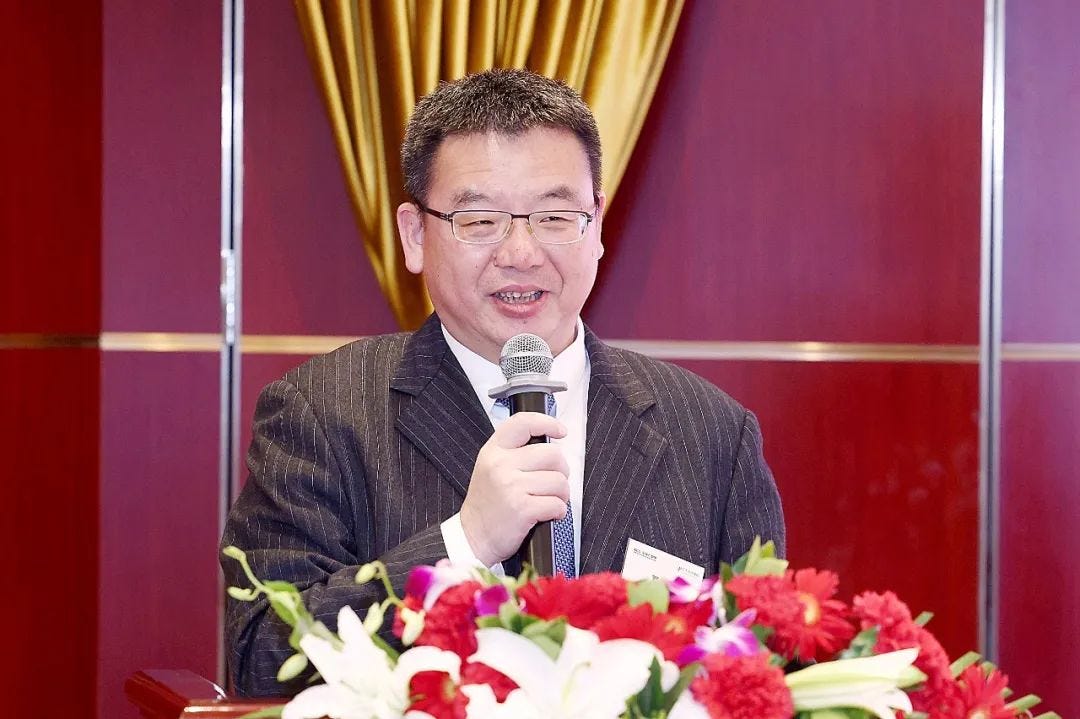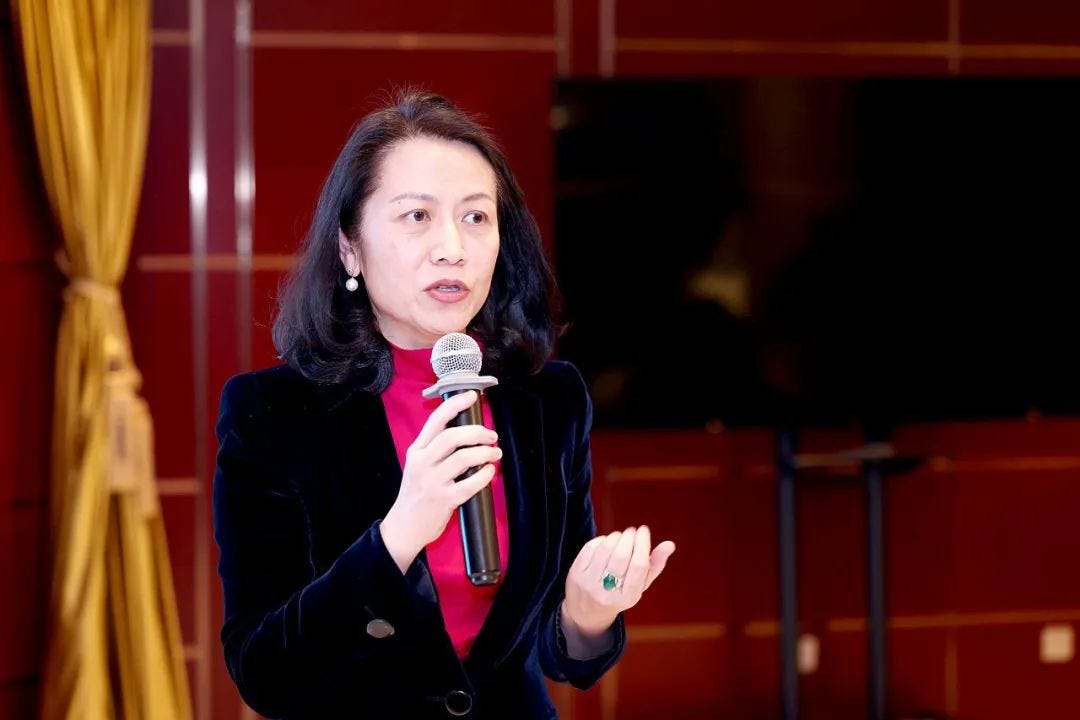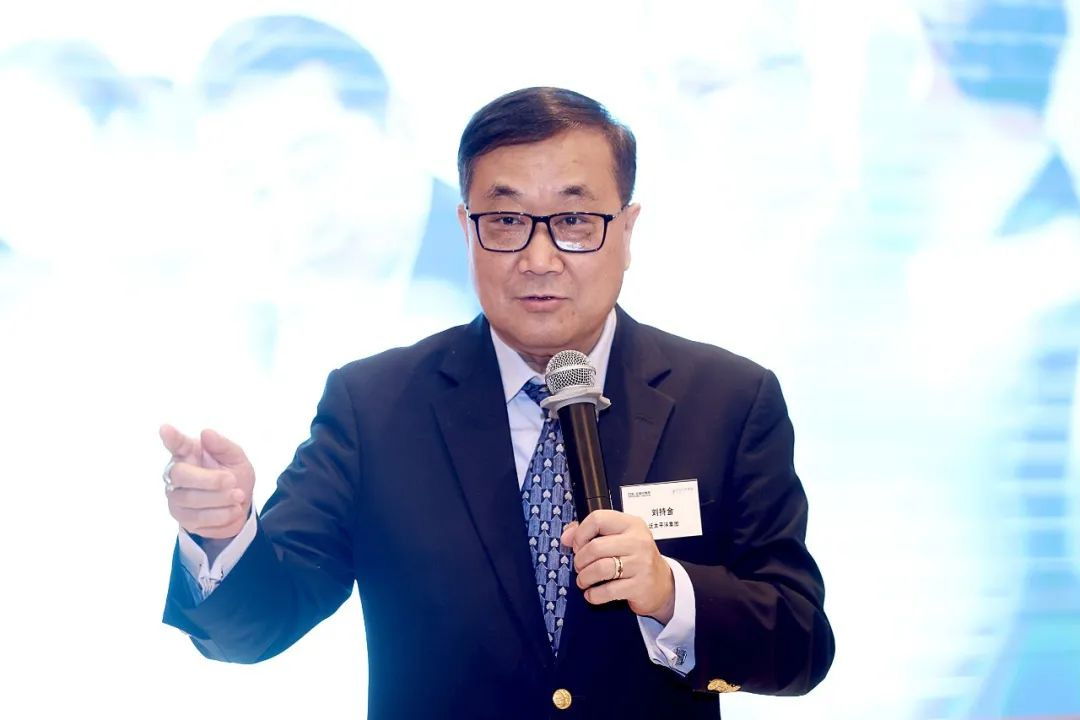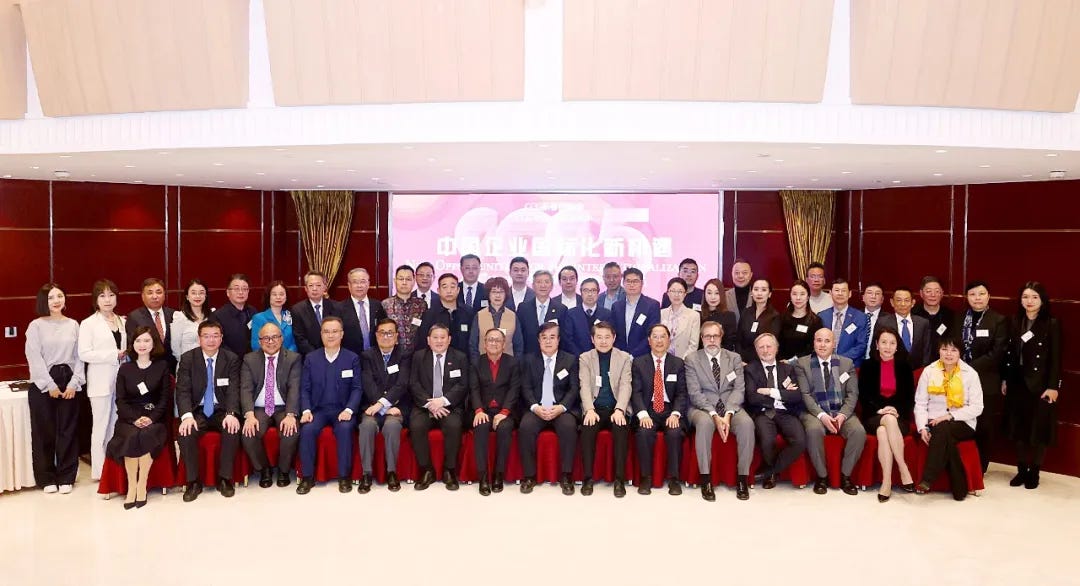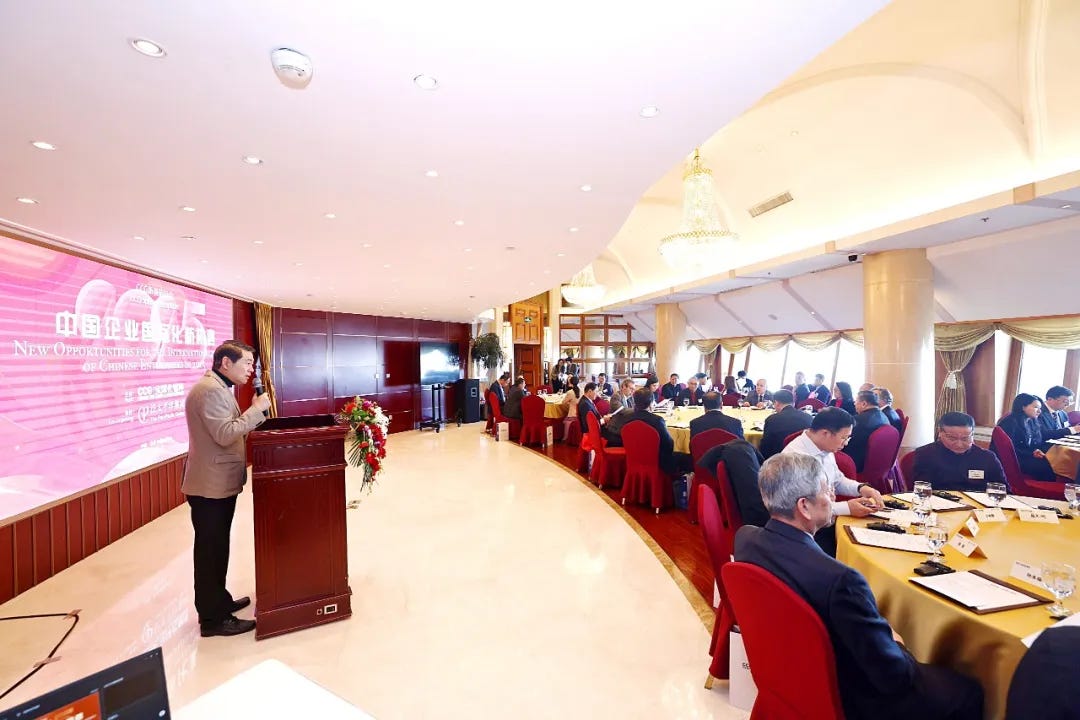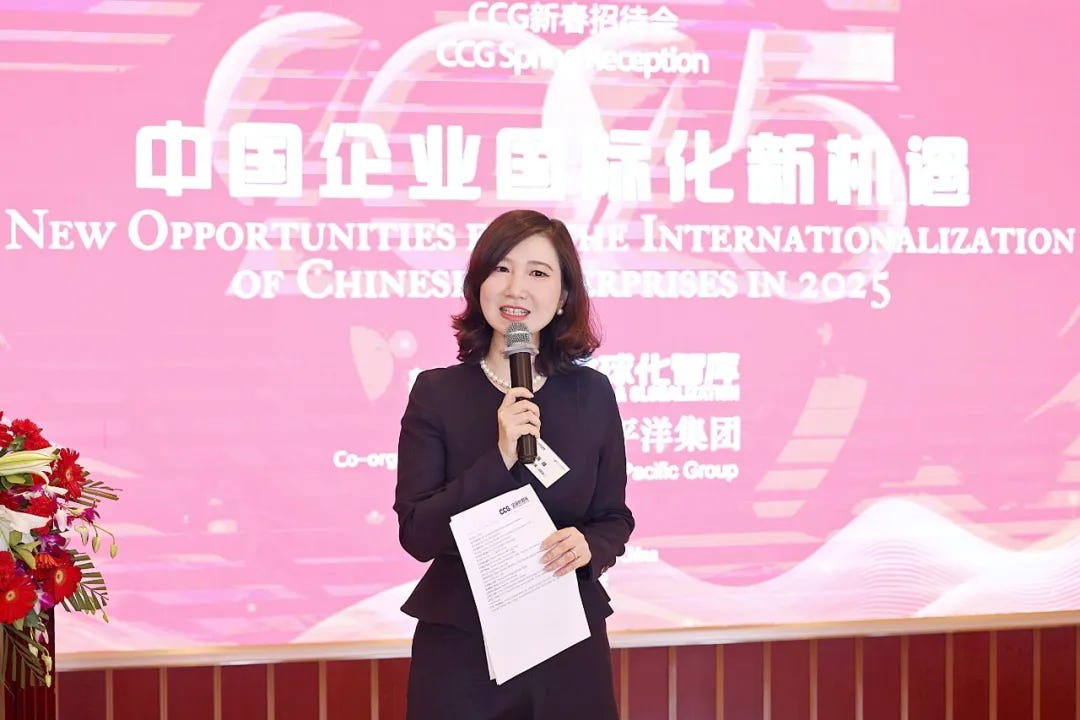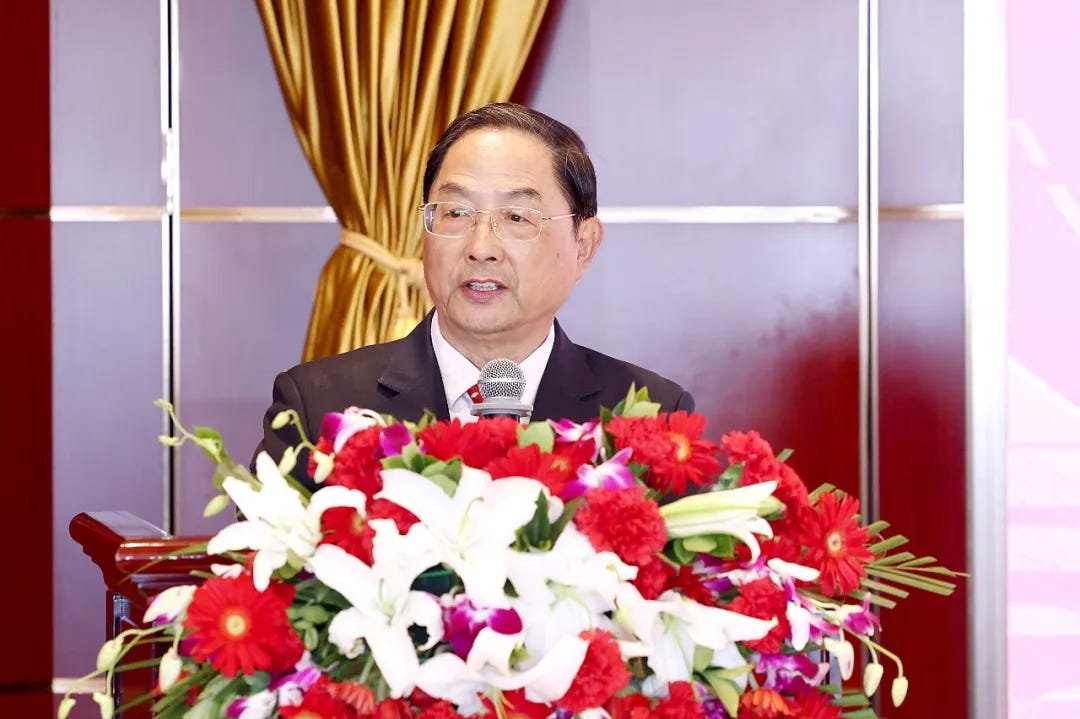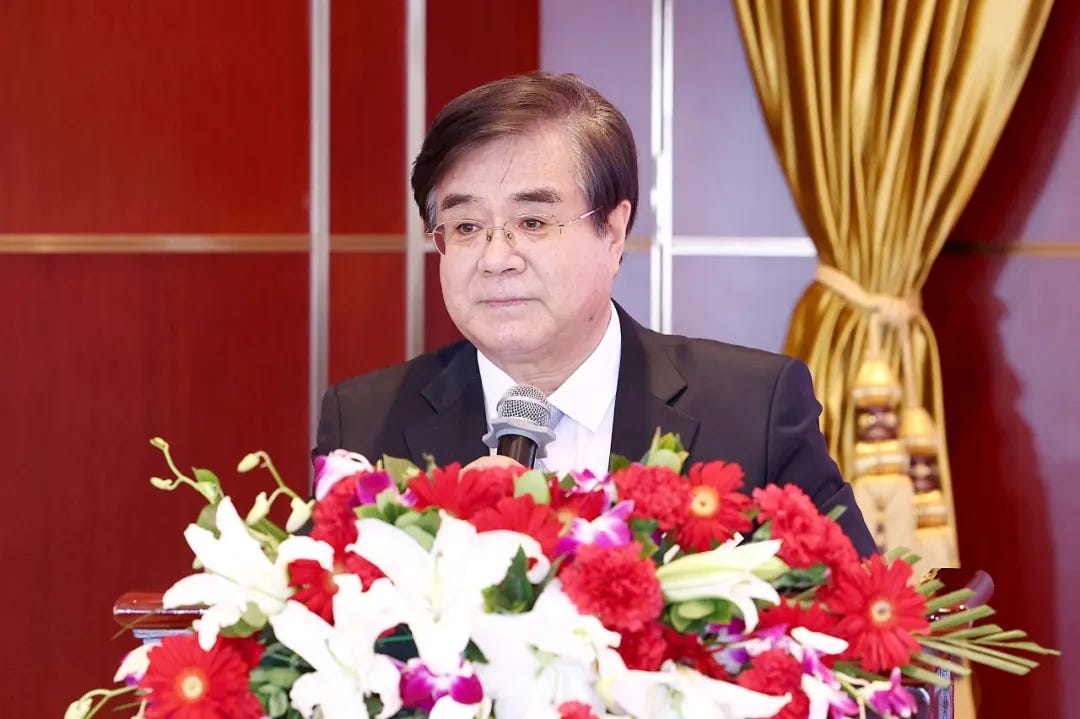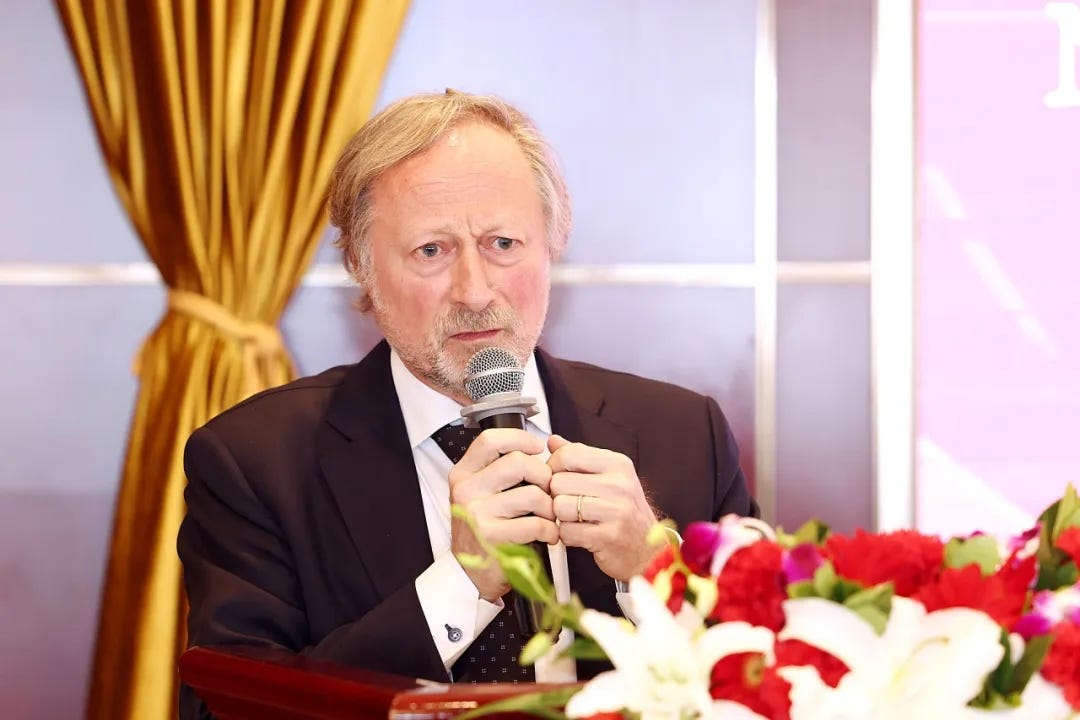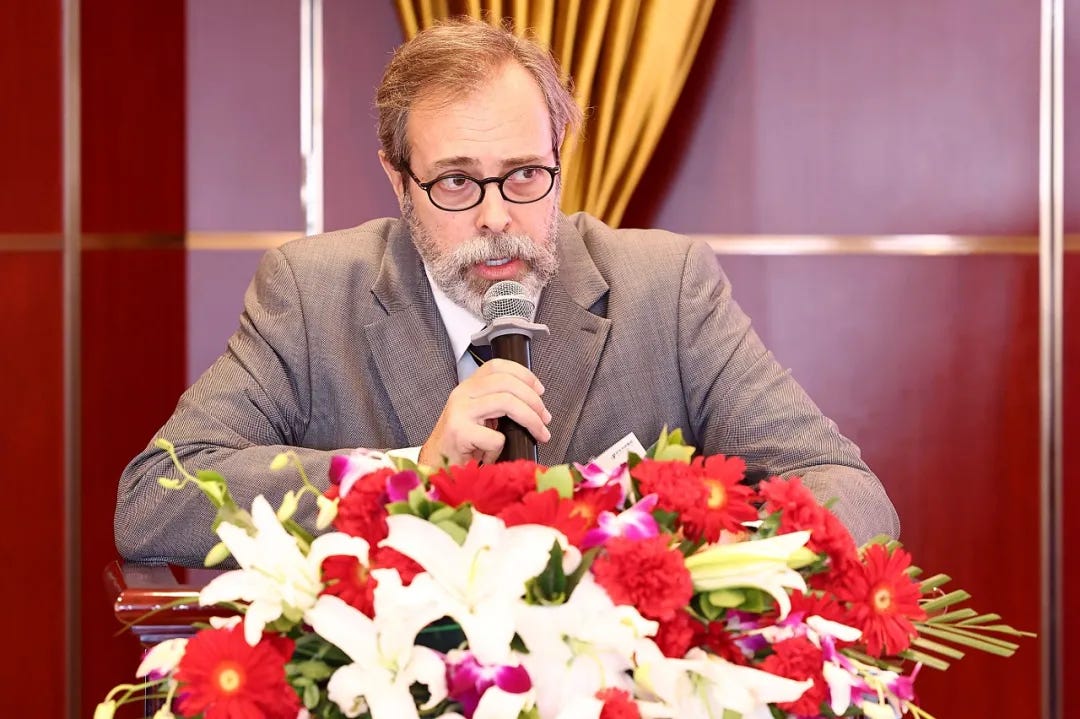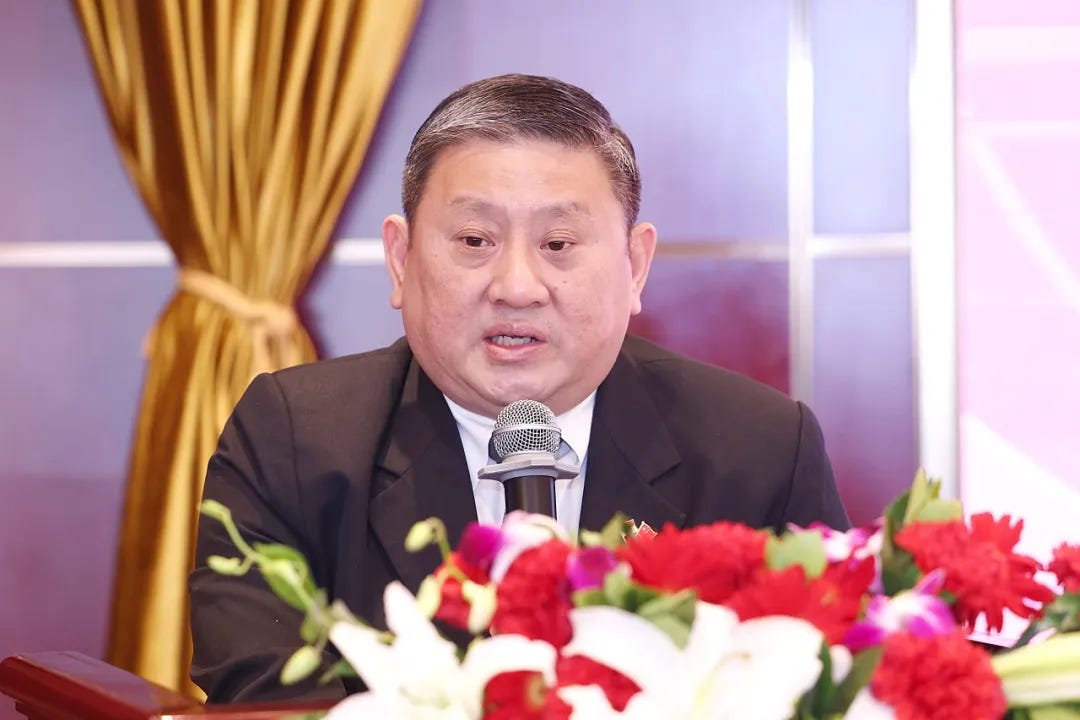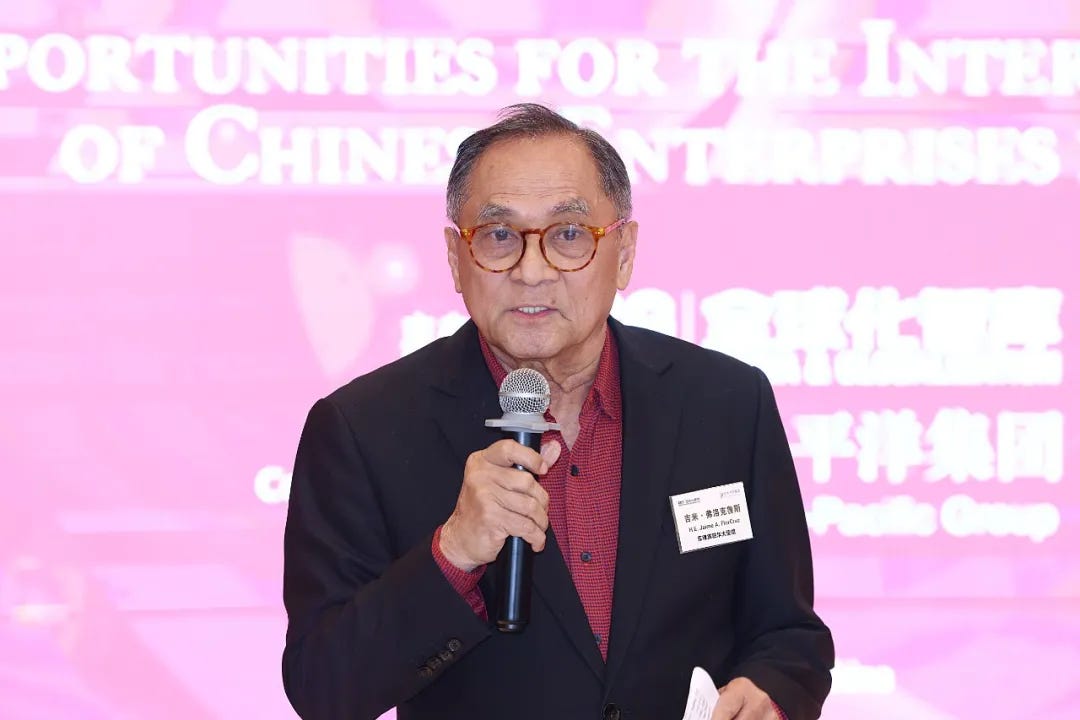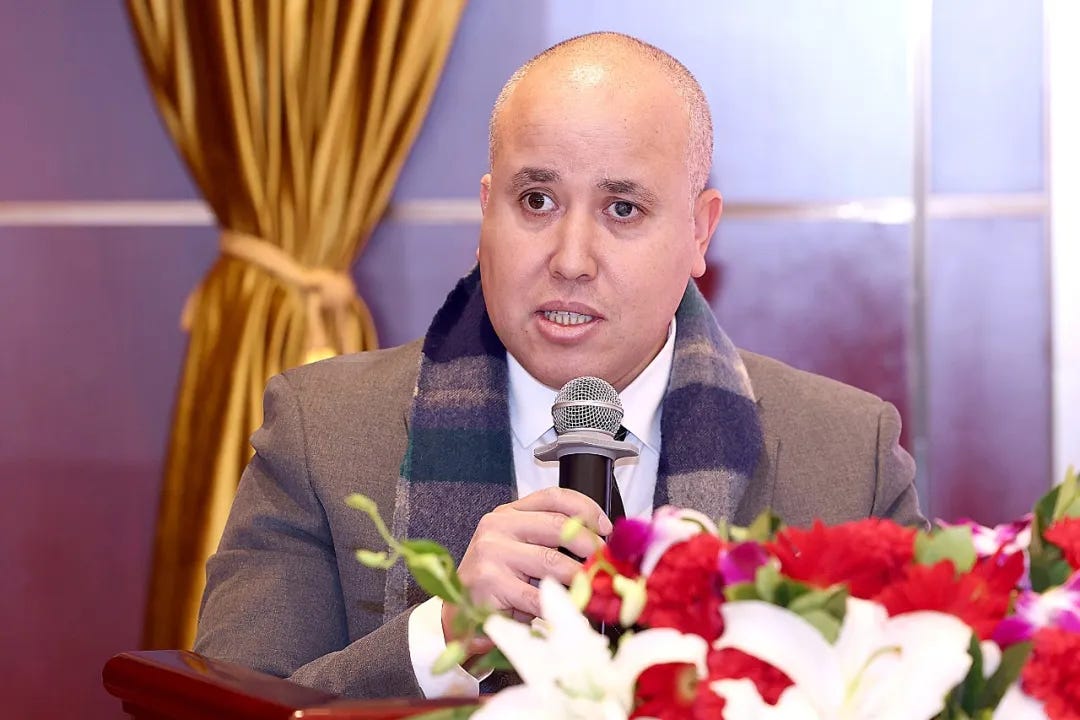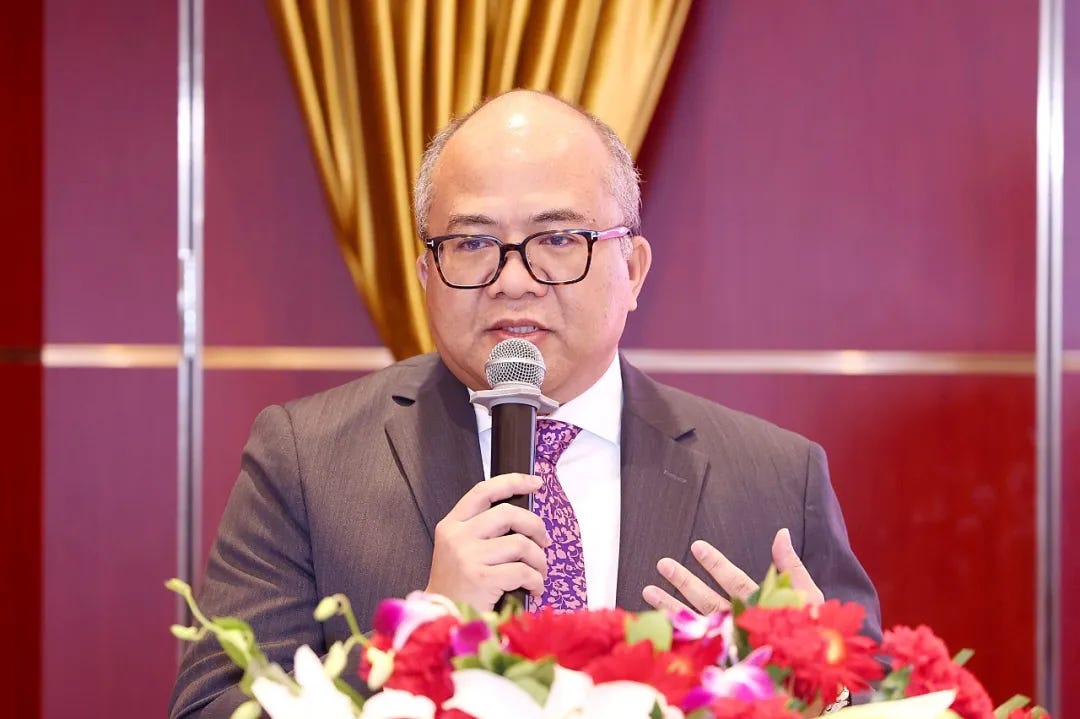Transcript: "New Opportunities for the Internationalisation of Chinese Enterprises in 2025"
Speeches from Jiang Yaoping, Zhou Yanli, as well as ambassadors and senior diplomats of Belgium, Portugal, Singapore, the Philippines, Morocco, and Indonesia.
On February 22, 2025, the China Center for Globalization (CCG) partnered with the Pan-Pacific Group to host a Spring Reception in Beijing. The event, themed “New Opportunities for the Internationalisation of Chinese Enterprises in 2025,” brought together ambassadors, senior diplomats, former Chinese officials, as well as Chinese entrepreneurs and investors. Attendees gathered to discuss new opportunities and potential for cooperation with Chinese enterprises venturing into the global market.
Below is the transcript of remarks made by Jiang Yaoping, former Vice Minister of Commerce of China, and Zhou Yanli, former Vice Chairman of the China Insurance Regulatory Commission (CIRC) of China, along with ambassadors and senior diplomats in Beijing. Please note that the transcript, based on a recording, has not been reviewed by the speakers.
Jiang Yaoping, former Vice Minister of Commerce of China
Dear President Wang, (Vice) Chairman Zhou Yanli, distinguished ambassadors, honoured guests, entrepreneurs, ladies and gentlemen, and friends, good afternoon. I am very pleased to attend the Spring reception hosted by CCG and the Pan-Pacific Group and to join all of you in discussing development and shaping the future together.
As we enter 2025, the global geopolitical landscape is shifting dramatically. The path for Chinese enterprises going abroad is filled with both opportunities and challenges. However, on the whole, opportunities far outweigh the challenges. Why do I say this? I would like to share with you the following set of data.
First, China’s foreign trade has reached new heights. Last year, the total value of imports and exports surpassed 43.85 trillion yuan, up 5% year on year. This means an increase of 2.1 trillion yuan compared to the previous year’s 41.7 trillion yuan [$6 trillion]. This amount is equivalent to the total annual trade volume of a medium-sized country. China has been the world’s largest trading nation for eight consecutive years.
Second, new productive forces are driving fresh momentum in foreign trade. The “new trio” [electric vehicles, lithium-ion batteries and photovoltaic (PV) products] continue to grow: exports of new energy vehicles exceeded 2 million units last year, cross-border e-commerce imports and exports reached 2.63 trillion yuan [$362 billion], growing by 10.8% year on year. Digital trade has become a new engine for the growth of China’s foreign trade, and Chinese manufacturing is evolving towards digitalisation, intelligence, and sustainability.
Third, emerging markets are rising as a group. Last year, China’s imports and exports to countries involved in the Belt and Road Initiative grew by 6.4%, accounting for more than 50% of total trade for the first time, reaching 50.3%. China has become a major trading partner for over 150 countries and regions, and the collective rise of the Global South is fundamentally reshaping the global trade landscape. These are the three “new” aspects of merchandise trade. Next, I will talk about the three “new” aspects of service trade.
Service trade also reached a historic high last year, with the total value reaching 7.5 trillion yuan [$1.03 trillion], a growth of 14.45%, far surpassing the growth rate of merchandise trade, and for the first time exceeding 1 trillion USD.
The second “new” is the remarkable results achieved by institutional innovations. The relaxation of the visa-free transit policy demonstrates China’s open posture. Tourism services grew by 38.1% last year, becoming the largest sector in service trade.
The third “new” is the thriving knowledge-intensive service trade. The “new trio” of cultural exports—online literature, web dramas, and online games—are flourishing. Excellent works such as Black Myth: Wukong and Nezha 2 are making their way to the world stage. It is especially worth mentioning that the DeepSeek app achieved a staggering 110 million downloads within its first month of launch. With its innovative genes and technological strength, DeepSeek is empowering industries across various sectors and opening a new chapter in the development of artificial intelligence.
These data demonstrate the growth in both volume and quality of China’s foreign trade, highlighting the strong vitality and resilience of the Chinese economy. China’s foreign trade continues to improve, injecting momentum into global trade development and boosting international market confidence.
Looking ahead to the new year, we believe that the continuing positive foreign trade trend and the increasing “new” content will provide ample space and strong momentum for China’s high-quality economic development, creating more opportunities for enterprises going abroad. China will continue to offer high-quality Chinese manufacturing and Chinese innovation to the world, contributing Chinese wisdom and strength to global economic development.
Finally, I wish you all a happy New Year, good health, prosperous careers, and happy families. Let us join hands and create a bright future together. Thank you, everyone.
Zhou Yanli, former Vice Chairman of the China Insurance Regulatory Commission (CIRC)
Thank you, Secretary-General Miao. Honourable Henry Wang, Founder & President of CCG, honourable Jiang Yaoping, former Vice Minister of Commerce, and your Excellencies, Ambassadors, I'm very pleased to be here. I would like to share with you some of my thoughts, especially about high-level financial opening up, high-quality development of banking and insurance sectors, and better serving the high-quality projects of the Belt and Road Initiative.
Everybody knows that dating back 12 years ago, President Xi Jinping proposed the Belt and Road Initiative (BRI). Since then, with concerted efforts of all participants involved, through the hard work of enterprises activity taking part, infrastructure connectivities among all participating countries have been continuously improved, and the skill and the quality of trade and investment have steadily increased.
Just now, everybody heard from Minister Jiang, that it's not only trade about also services trade that has greatly improved around the Belt and Road Initiative. Diversified investment and financial systems have been gradually established. The Belt and Road Initiative now, I think, has entered a new stage of high-quality cooperation.
Since 2013, Chinese banks and insurance firms have continuously optimised their overseas presence. They have expanded their presence by offering innovative products. They strengthened monetary cooperation by providing financial services and support for BRI projects that need them, contributing to substantial, steady, and sustainable progress of BRI cooperation.
By the end of June 2024, 13 Chinese banks had established 145 first-tier institutions in 50 participating countries. Six Chinese insurance firms have established 17 first-tier institutions in nine participating countries.
These institutions have provided projects with financing support and insurance risk solutions for more than 3,000 projects. China’s National Administration of Financial Regulation, which publishes a lot of supporting documents, has entered into MoUs on regulatory cooperation with financial regulators of 56 participating countries, consolidating the foundation for cross-border regulatory cooperation and creating a favourable external environment for financial cooperation under the Belt and Road Initiative.
In light of President Xi Jinping’s guidance on effectively promoting high-level financial opening up, enhancing cross-border investment and financing, and facilitating and increasing financial support for BRI cooperation, banks and insurance firms will continue to improve their capabilities to provide financial services for BRI cooperation. They will maintain their commitment to maintaining high-quality standards of their services, achieving mutual benefit through financial cooperation and business development, while promoting green development, benefiting people's well-being, and ensuring compliance of business operations. This will also lay a solid foundation, especially for business development, advancing technology, and ensuring high-quality development in BRI cooperation.
In the future, I think Chinese banks and insurance firms will work hard on the following points.
First, they will pursue maintaining high standards by expanding product offerings and strengthening financial services. Banks and insurance firms will leverage their strengths in providing financial products, not only for traditional but also innovative businesses and services, expanding their product offerings to provide more flexible and diversified financial services for BRI cooperation. A variety of means will be adopted, such as cross-border financing, syndicated loans, and significant flows of currencies. Everybody noticed that the People’s Bank of China recently published a document encouraging enterprises in BRI participating countries to use RMB to pay for business and to settle their accounts. Also, investment cooperation funds, equity investment, and green bond issues will be used to mobilise more funds to join the support of BRI cooperation. In addition, the China Belt and Road Road Reinsurance Pool will be given full play to provide more insurance protections and risk solutions for BRI cooperation.
Second, they will pursue the path of achieving mutual benefits through their openness by strengthening multilateral cooperation and making collective efforts. The Belt and Road initiative is a real chorus comprising all countries along the Belt and Road; not only a solo for China itself. Banks and insurance companies will continue to enhance multilateral cooperation to build a comprehensive and multi-tiered financial cooperation network for the Belt and Road.
Chinese financial institutions will further strengthen coordination and promote effective resource allocation. They will actively collaborate with foreign counterparts and multilateral development institutions to build a community of interests under the principle of sharing benefits and risks.
Third, they will pursue the path of green development by implementing the concept of green development. BRI points the way not only for economic prosperity but also for green development. Banks and insurance firms will continue to support the construction of a high-level, green Silk Road, actively implement green investment principles—what we call the “GIP” for the BRI—and provide more support to environmental protection, energy conservation, emissions reduction, and green transportation, and other related sectors in participating countries. Efforts should also be made to promote the two-way opening up of the green financial market.
Fourth, they will pursue the path of benefiting people’s well-being by actively fulfilling social responsibilities. People-to-people exchange is not only an important component of the Belt and Road initiative but also provides an essential social and cultural foundation for high-quality development. At the same time, it effectively supports key sectors and major overseas projects. Banks and insurance firms will focus more on “small-yet-smart”, people-centred programs that appeal to the direct benefit of local people. In the future, they will fulfil their social responsibilities to build a community with a shared future for mankind, so as to ensure that the achievements of BRI cooperation better benefit the people of hosting countries.
Fifth, they will pursue the path of compliance by adhering to a systematic, regulatory approach to strike a balance between development and security. Banks and insurance companies will make compliance an integral part of their engagement in high-quality BRI cooperation. They should abide by the laws, regulations, and customs of hosting countries, as well as relevant international rules, maintain integration in business, and effectively serve the well-being of local people, so as to win public support for practical operations.
Okay, that’s all I have to share with you. Thank you all very much. I wish you every success in the New Year. Thank you.
Bruno Angelet, Ambassador of Belgium to China
[Speaking in Chinese] Hello, my friends from China. My name is Bruno Angelet. I have been in Beijing for one year. As my English is better than my Chinese, I have to make my speech in English. Thank you.
[Speaking in English]
I'm very honoured of your presence. Dear Henry, dear Mabel, thank you. It's great you bring us here together. I thought I was invited for a great evening and a gala dinner. I didn't think I had to work for it. So you're asking me to give a snapshot about Belgium and in relations with China, but I also will say a few words about the EU and China. I think for all European ambassadors here, the only way to reflect about our bilateral relations is to put it in a wider framework.
Many Chinese friends know that Belgium is good at producing food. We have the best beers on earth. The chocolate is good. We do comics, etc. But maybe I must give you a little snapshot of what Belgium stands for in relations with China.
First, Mabel, you mentioned it. We're the biggest logistic hub in trade flows between China and Europe. That is because we are centrally located, and within 400 kilometres around Belgium you'll find 60% of Europe's GDP. We have a small coast of 60 kilometres, but we have very big ports. The port of Antwerp-Bruges is today, in terms of container volumes, the biggest port in Europe. And Antwerp-Bruges is the No.1 importer of electric vehicles from China. Most of the Teslas and the BYDs and the others going to Europe are coming actually in our port, and today we lack space for them.
We also have today close to 50 flights per week connecting Chinese cities with Belgian cities, of which, by summer, 28 passenger flights connecting Shenzhen, Shanghai, Beijing, and Chengdu, and possibly also Chongqing with Brussels. And we do a lot of cargo flights, an enormous cargo volume.
I said we only have 60 kilometres of coast, but we are the No.6 producer worldwide of offshore wind energy. It's quite amazing. We have been bypassed by China two years ago, but before that, we stood just before China in terms of megawatt production of offshore wind energy.
And I'm sure you know Belgium is the No.1 producer of vaccines, in absolute figures. During COVID, you may not know that most of the Pfizer, AstraZeneca, and GSK vaccines spread all over the world came from Belgium. Just to add that in biopharma, we have the highest number of clinical trials per capita in Europe. So we have a very powerful biopharma ecosystem.
In research and development, I have checked with the people of Springer Nature. Springer Nature is the owner of the British Scientific Review on Science. In 2024, China's quality and quantity of scientific literature stood equal to the average of the EU15 member states. I'm not saying EU27 member states, I mean EU15, the member states that were the core members before the big enlargement of 2004. Well, guess what? Belgium stands 15% higher than China and the EU15 in terms of quality and quantity of scientific literature. So just saying, that we're actually a small country, but we are quite good at several things.
The last point I would like to say is that we are very big in chemicals, and Belgian companies invest a lot in China in the chemical sector. You may know Solvay, Syensqo, and Umicore. They are very strong also in the circular economy.
So big Chinese investments take place, like Geely. Most of the electric Volvos produced today in Europe are produced in Ghent. And I understand Geely will reduce the production of Volvo EX30 in China to bring the production over to Belgium. Of course, we have Cainao and Alibaba. The e-commerce hub of Cainao in Europe is in Liege, Belgium. Of course, we have investment of COSCO in port terminals. And we have, of course, the presence of most of the Chinese banks who have headquarters either in Luxembourg, our neighbouring country, or in Brussels. That is a few words on Belgium.
And if you were asking me, what do we want to do more with China? Of course, we would like to export much more to China. We are the 7th trade partner of the EU member states with China. I don't think we will invest much more in China for many reasons. I will not explain that here. But we probably are looking now more aggressively towards Chinese investments in Belgium—in several areas, in the non-critical areas, so that there are no dependencies. But if you think about the discussion we have on electric vehicles, chemicals, or biopharma, I think we Belgians are eager to receive Chinese investments upon a few conditions.
And let me switch now to the EU, and then I will finish. Because, Vice Minister, it's very interesting to hear you summarise trade figures and the trade dynamics of China. And I think for us Europeans, the 21st century is a new normal, meaning we live with China's increasing role. And for us Europeans, it's something new. But many people tell us, no, it's absolutely normal, because three centuries before, China has always been the biggest trader on earth. So we have to get used to it. And I think we Europeans, at least we Belgians, we embrace a bigger role for China in the world. It is good for many people in Europe.
Key questions, however. First, you may know that the EU has a relationship with the U.S. that is a little bit similar to China's relationship with the EU. Let me explain. China has a big trade surplus with the EU. But guess what? The EU has a big trade surplus with the U.S. China invests in the EU, not enormously; and the EU invests in China. But actually, what we invest in China is a very tiny part of what Europeans invest in the U.S. Actually, we're the biggest foreign job provider in the United States. It may sound a little bit provocative, but what we invest in China is not more than what Europeans invest in Texas. So be aware, our relationship with the U.S. is very complicated.
And of course, we still remain a trade surplus continent. The EU is exporting enormously, as is China. Consumption is going down, and European citizens save a lot of money, so there's actually a lot of cash flow available for the banking sector, and we have to tap from it, and leaders are working on it.
But if I come to China, the relationship between China and Europe is a little bit more complicated, because China has an enormous trade surplus with Europe. Someone said, a historic, never-seen-in-humanity surplus with us. And in 2024, your surplus increased, because what is happening is that China is very important. And of course, I'm fascinated. I admire the economic governance of China, but I don't think the whole world can stay neutral with the following.
Since 2008, the growth engines in China were real estate and infrastructure. After the financial crisis, the leadership suggested the banking sector and industry to develop infrastructure and real estate. Infrastructure, you did a wonderful job. It's very impressive. Real estate, the leadership wanted to ensure citizens could have access to affordable real estate. So it's a matter of providing prosperity to the people of China. And that's also very impressive, but I think today, infrastructure and real estate are no longer engines of growth, so the leadership decides that it's industry.
But now let us think about this. If industry should fuel growth, but domestic consumption remains low, what the leadership is telling, and what the banking sector is doing, is offering credit expansion and credit export, so that you can export.
So in 2023, China had a surplus with 150 countries on earth. The only deficit countries, or those countries who have a surplus with you, are extraction economies. It's Brazil, Australia, Angola, Gabon, Mongolia, because they provide you with mineral resources, but all the other countries have a deficit with you.
And in 2024, you even exported much more. And I think, I must say to our Chinese friends, it cannot be that China becomes the main, if not only producer, and that all the other countries are reduced to being consumers. That will not happen. We, European leaders, cannot simply not sit and wait, and lose industry and jobs.
I think the equation we have to think about with our friends of China is, as our Chinese friends have told us 30 years ago, please invest in China in joint venture, transfer technology, organise your supply chain in China, for China, and create sustainable jobs. I think the time has come for us Europeans to have the same conversation with China. And I would think there is probably a way to support Chinese investments in Europe, provided you do it in joint ventures, with transfer of technology, you build your supply chains in Europe, and you create added value and jobs. I say added value because I don't think the leadership will favour Chinese investment in assembling in Europe for a long time because the issues are too big. But I think there's a real way to come around it, and I think the coming months are really critical for us to discuss.
So, for the business people who are here, let me say that, of course, we are very impressed by the dynamism of Chinese companies, the extremely effective industrial ecosystem that there is in China, and also the R&D ecosystem. But I think in the future, we will have to balance that. China needs more place in multilateral diplomacy and in trade and business worldwide, but at the same time, please think about the fact that it doesn't mean that we will reduce production. We also are a very big industrial producer in Europe, it will remain like that, and we want to become more competitive.
So let's think about how to build up a partnership along those terms. Sorry, I was a little bit too long, but thank you very much. Xie Xie.
Paulo Jorge Nascimento, Ambassador of Portugal to China
Thank you very much, Mabel, thank you very much, Henry, for your kind invitation to be here with all of you today. Well, let me tell you from the outset that I don't share with my Belgian colleague his capacities in Chinese, so I will spare you many words from my side in Chinese since it will shame me for sure. So I won't do it. So I will keep on in English.
The first thing I keep thinking all these days is that it's an obvious thing: we are really living in what I would call challenging times, definitely. But at the same time, we cannot look at challenges without also seeing opportunities.
If I may, from the European point of view, I share completely the views expressed by my colleague Bruno before in what concerns the relationship between China and the European Union countries. We need probably to reshape this relationship in order to profit and make it better. And there are no good opportunities, and most of you, ladies and gentlemen, are from the business world, so you probably will perfectly understand that business is only good if it is good for both parties. And this is very much essential in terms of the relationship also between the European Union and China. We need to find a way to balance it. We need to do it through dialogue, and that's mostly our advice.
Speaking about dialogue and speaking about Portugal and China, indeed, Portugal only established diplomatic relations with China 26 years ago, so quite recently. But at the same time, indeed, Portugal and China do have a historical relationship that goes back centuries. And in that sense, in the more recent years, we have been assisting these last 26 years of diplomatic relations over the deepening of the relation between Portugal and China.
Let me recall to you that basically, all Presidents of Portugal paid a visit to China during their tenure. Since these 25 years of diplomatic relations, all Chinese Presidents went to Portugal at least once. Visits of Prime Ministers and Ministers of Foreign Affairs also happen regularly. And more recently, if I may, just to remind you, we had in Portugal in 2023 Vice President Han Zheng. And in April 2024, our Minister of Economy came to China. The same year, in June, Minister Wang Wentao went to Portugal. This last year, in November 2024, Chairman Zhao Leji went to Portugal and also paid a visit to our parliament. He was, of course, received by our Prime Minister and by our President. And soon, we will have in China the visit of the Minister of Foreign Affairs of Portugal, my Minister of Foreign Affairs.
So, we have strong connections. We have always preserved and valued dialogue. From the economic point of view and the business community, I will just mention that in Portugal we have quite impressive investments from Chinese companies. For instance, China Three Gorge Corporation (CTG)'s investment in our electric utility company. China's State Grid Corporation is a shareholder of our distribution network company. There are several bank participations from China in the bank system or the insurance system in Portugal.
Well, today is the 22nd. So in two days in Portugal, it's going to be presented what is probably the biggest investment of a Chinese company in Portugal. It is CALB, the China Aviation Lithium Battery. They're going to launch their unit for battery production in Portugal. It is an investment of, in the first phase, around 2,000 million euros.
So these are, I think, examples of the openness of my country to Chinese investment. We think that we can only be attractive by providing to Chinese (investment) with a non-discriminatory environment for investment, but also not only because of the specific dimension of Portugal, which is, by nature, a country of 10 million inhabitants. We are not as central to Europe as Belgium is, but we are proud to be central to the access to South America, North America, and Africa. And we see these relations that we established very carefully and that we have worked ever since with these different geographic regions, the centre of our policy also in terms of attractiveness of investment.
So it is in this perspective that I hope we will be able to manage and go through all the challenges that we are facing nowadays, believing truthfully as a country, that we have to find solutions for common problems that nobody can solve by themselves.
So it is with this appeal for the Chinese community, but also for the Chinese authorities that I would like to end my intervention saying and restating here our openness and welcoming everyone who like to know or learn more about Portugal's business opportunities. The embassy will be ready to be helpful. Thank you very much.
Peter Tan Hai Chuan, Ambassador of Singapore to China
The Honourable CCG President Henry Wang, Secretary General Mabel, the Honorable Mr. Jiang Yaoping, the Honourable Mr. Zhou Yanli, fellow ambassadors and diplomatic colleagues, distinguished guests, ladies and gentlemen.
First of all, allow me to convey Lunar New Year's greetings in Chinese. [Speaking in Chinese] Today we're still in the first month of the lunar calendar. I wish everyone prosperity in the Year of the Snake, good health, happiness for the whole family, and success in all endeavours.
[Speaking in English]
Thank you for inviting me to the CCG Spring Reception. The theme, “New Opportunities for the Internationalisation of Chinese Enterprises in 2025,” is a timely one. Chinese enterprises have ventured beyond China for some time now. But the wave of Chinese enterprises venturing abroad has certainly gained momentum in recent years.
There is no doubt that China's domestic market is vast. But there is certainly a recognition amongst the enterprises that they have developed to a stage whereby they also feel the need to search for new markets. New markets portend new customers, new ideas, and new growth. And this is well supported by the Chinese government. China's 走出去, going out policy, is also the roadmap in this era of overseas expansion that demonstrates China has the potential to produce truly world-class enterprises.
Let me speak a bit about ASEAN. In ASEAN, in fact, I think my colleagues at the table would agree with me that it is a perfect destination for Chinese enterprises seeking the 走出去, going out, or 出海, sailing out. ASEAN is not just about 10 countries. It is a 650 million-person party, and everyone is invited. China's going out, or sailing out policy meets ASEAN's booming digital economy and a region hungry for innovation.
In RCEP and ASEAN-China FTA 3.0, ASEAN is China's free trade partner. RCEP is like a VIP card for trade. It connects China to 14 other countries, including ASEAN: lower tariffs and smoother customs. ASEAN-China FTA 3.0 is the upgraded version of China-ASEAN trade. Think of it as a turbocharged engine for your business. And these cooperation agreements are not just paperwork, they are basically your turbocharged engines helping you to sail into ASEAN's booming markets.
As for Singapore, we can be China's regional control tower, matchmaker, and a launchpad into Southeast Asia. Together, we are building bridges, not just for trade, but for trust.
As several of the speakers before me have said, the world is changing fast, and the world is much more complex today. But one thing is clear, the future is regional. And Singapore and ASEAN are ready to be your partners in this 走出去, going out and sailing out journey.
So on this auspicious occasion, and in this seminar organised by CCG, let me just say, let's go out together. Because when we build bridges, everyone wins. Thank you very much.
Jaime A. FlorCruz, Ambassador of the Philippines to China
Thank you. I didn't really prepare a speech, although I noted some points. We live in a fast-changing, complex world. There are many factors which are fluid and intractable. And like all self-respecting nations and peoples, we, the Philippines, also wish to build a proud and prosperous nation. We love our country, like all of us, and we wish to make it great again.
Like all countries, we are determined to assert and protect our sovereignty and territorial rights as enshrined in the spirit of the United Nations Charter. And like everybody else, we wish to build our nation. We want nation-building to be our priority.
What is our Philippines dream? We dream of clear blue skies, clean water, clean land. We want stable jobs for everyone. We want a good healthcare and educational system, especially for our children and grandchildren. And if that sounds familiar to you, it's the same way that General Secretary Xi Jinping described China Dream when he took his post many years ago. That is how I remember he described China dream.
So we have common dreams. To achieve this dream, we need a peaceful and stable environment. And that's why we in the Philippines, while we assert our sovereign and territorial rights, are ready to coexist with everyone. We want to be friends for all and enemies to none. It's very simple, but I think it's also the basic wish of every human being. We need this peaceful, stable neighbourhood so that we can focus on nation-building.
So what opportunities are there for you in the Philippines? Our nation-building priorities, basically, are four.
One, energy. We need to improve and diversify our energy sources. Our energy cost is too high. So, we are interested to tap into China's breakthrough in energy, especially green energy, renewable energy, and storage. We welcome any opportunities that you may have in helping us improve our energy resources.
Second is agriculture. We want to modernise our agriculture. We want to diversify and stabilize the production of agriculture in the Philippines. So we also want to tap into China's progress in agriculture. We also want to learn from your experience in terms of poverty alleviation, because poverty alleviation basically means lifting the lives of farmers, especially.
Third is infrastructure. We want to tap into China's progress in terms of your investment and technology to improve our infrastructure: roads, bridges, and trains. We don't need 320 kilometres (per hour) speed. We will be happy if we can get 120 or 150 kilometres for our train.
Finally, people-to-people exchanges, and that includes educational, cultural exchanges, and tourism. We want to invite more Chinese tourists to the Philippines to enjoy our beaches, our nature, especially during winter. We welcome all the tourists from China.
So, we welcome any one of you whose businesses intersect with our national priorities. And on that, I wish everyone prosperity and happiness in the Year of the Snake. Thank you very much.
Radouane Chaouki, Deputy Chief of Mission of the Moroccan Embassy in China
Excellencies, distinguished guests, esteemed colleagues, ladies and gentlemen, Ni Hao, salaam alaikum, good afternoon. First and foremost, I would like to take a moment to wish all of our Chinese friends here today a very happy Lunar New Year. May this Year of the Snake, symbolising wisdom and serenity, bring success, peace, and prosperity to all of you.
It's always a great pleasure to participate in events organised by the Center for China and Globalization, an institution whose work has consistently set the standard for intellectual rigour and strategic foresight. The contributions of the CCG to global discourse are invaluable, and we at the Embassy of the Kingdom of Morocco follow its work closely with great interest. Allow me to mention that His Excellency, the Ambassador of His Majesty the King, couldn't join us today due to unfortunate circumstances. However, he has entrusted me with conveying his warmest greetings and heartfelt gratitude for the kind invitation to this significant event.
Excellencies and distinguished guests, as we step into the Chinese New Year, it's a fitting time to highlight the critical importance of cooperation with renowned think tanks such as the CCG. These collaborations offer invaluable opportunities to exchange ideas and perspectives on key global issues. The quality of the CCG's work is evident in its insightful analysis and forward-thinking viewpoints.
The Embassy of the Kingdom of Morocco stands ready to explore new avenues of cooperation with the CCG. We recognise that greater mutual understanding and more frequent exchanges are essential for building stronger bridges between our two countries.
Excellencies, ladies and gentlemen, Morocco has now pursued an open and inclusive foreign policy grounded in the principles of mutual respect, South-South cooperation, and sustainable development. Our strategic initiatives in Africa, such as the Royal Initiative to enable Sahel countries access to the Atlantic Ocean and our partnership in the African Atlantic Gas Pipeline reflect this commitment to regional integration and growth and greater cooperation with major players such as the People's Republic of China. These projects, which enhance both regional connectivity and energy security, align closely with China's broader efforts to support infrastructure development across Africa.
In this regard, it's worth mentioning that by studying such regions and by going global—let's say, for think tanks to go global and study these initiatives and projects in such places as Africa will give insightful ideas, thus allowing more entrepreneurs and more investors from China to invest, go global, and of course, have a clearer picture of what's happening and what such countries in Africa are offering to the investors.
To give you a glimpse of what Morocco can offer Chinese enterprises. As you know, Morocco serves as a strategic hub for internationalisation as it's deeply rooted in Africa, near the European Union, and also connects China with the Middle East. When it comes to investments and what Chinese entrepreneurs can benefit from investing in Morocco and making it a gateway for their investments, let me focus on two or three points.
As I mentioned, the strategic location between Africa, Europe, and the Middle East offers countless opportunities in terms of connectivity and in terms of making Morocco the gateway and hub. As I always say to our colleagues in China, “Don’t focus on Morocco as the final target but make it a gateway to the African continent and also to other countries with whom Morocco signed FTAs.” So I can give you a glimpse. It's more than 58 FTAs that have been signed up to date, allowing and giving the opportunity to Chinese entrepreneurs to reach more than 2.8 billion consumers worldwide.
The second and most important point is that when you invest in a country like Morocco, it will allow you to have direct access to one of the youngest populations around the world.
The third point, also a very important one, when it comes to the decision-making of investing abroad is the world-class infrastructure. And they can tell you that Tanger Med Port in the north of Morocco and one under construction in the south of Morocco in Dakhla are already in good direct connections with more than 71 seaports around the globe.
Last but not least, I can tell you that political stability is another key factor and a key point in making the decision when it comes to investment. I will keep it short. Thank you very much for your kind attention.
Parulian Silalahi, Deputy Chief of Mission of the Indonesian Embassy in China
Good afternoon. It's definitely a difficult task to speak after distinguished speakers, ambassadors, and, as a junior diplomat, my seniors here, I don't really know what to say. But let me start by joining others in congratulating the Chinese New Year in the Indonesian language: Selamat Tahun Baru Imlek. Semoga sukses dan sejahtera di Tahun Baru Ular ini. I can see the translator is confused, but I think I just said Gong Xi Fa Cai.
Dr. Henry Wang, Founder & President of CCG, excellencies, Ambassadors, honourable speakers and leaders, distinguished participants, ladies and gentlemen, thank you for the opportunity to attend and address at the CCG Spring Reception.
To speak about Indonesia, I think the economic statistics are openly available to everyone. I'm sure businessmen and entrepreneurs are more knowledgeable than me. Maybe in short, what I can propose is to say, come to Indonesia while maybe it is still a bit messy. Because if we are well established, I will not be standing here. I will be back in Jakarta trying to select from the queuing investors because everybody wants to come in. While the opportunity is still there, I know as a developing country, we can still talk if there are regulations non-existent—what do you need if the regulations are not entirely accommodating—a lesson that we have learned from our neighbouring countries in ASEAN in how we would like to step forward in developing Indonesia.
And a bit of news from Indonesia. Yes, we just had our new President, Prabowo Subianto. If you follow the news, one of the major programs of his, which might be surprising in a big nation like Indonesia, is to provide a free lunch program for students.
On this occasion, let me just tell a bit of a story. If you remember, Duflo and her husband in 2019 received the Nobel Prize in Economics for global poverty alleviation. Although Indonesia was not the real cause that they had the Nobel Prize, they had several researches done in Indonesia back in 73 up to 79. In the 70s, there was a very elemental program in Indonesia, which was the biggest program, six years of mandatory primary school education. We built almost 61,000 schools back then. It was the biggest at that time. And that had an impact on our growth in the 80s and up to the 90s. That was an intervention back then. There was also a study about our universal healthcare, the BPJS done by Duflo in Indonesia, which, of course, contributed to their understanding and their receiving the Nobel Prize.
Now this is also the same thing, the intervention that our President Prabowo would like to instil in Indonesia. We have a young population, 285 million among the 600 million in ASEAN. We have a young population that has to be ensured with future growth so that they can be the middle class of Indonesia in the future. So, of course, this coordinates the economic potential for our Chinese investors and traders to come to Indonesia and invest and trade with us.
Now normally, I would also like to promote Indonesia in the context of the ASEAN, but Ambassador Peter Tan and Ambassador Jaime have already, hopefully, convinced you to come to ASEAN. From my side, maybe I have repeated this on a couple of other occasions. Just consider ASEAN like a house. When you enter a beautiful mansion, a big one, because this is 600 million (people), as the Ambassador has reminded us, you will see a majestic gate and you can immediately think, “It must be our Singapore. It is very inviting.” You go to the foyer. You have a place to hang your coat nicely, and a beautiful mirror to comb your hair. Of course, that's what you can have—all the facilities, and good services, like a city-state, Singapore.
You go further to the house, you have a nice living room. Of course, we can easily say, “Oh, that's like in Malaysia.” You have everything there, a nice living room, and you go to the left or to the right, you can maybe see a romantic master bedroom. “Oh, yes, this must be our neighbour, Thailand.” And in the master bedroom, you have the clothing and a safe deposit box, a very big one. “Yes, we can imagine easily that must be Brunei. All our golds are there.” And then, of course, the bustling kitchen. It can be our colleagues in the Philippines, in Cambodia, where we are cooking and eating, all the family. The Philippines is a family room with home entertainment. We are happy. We can be frank with each other.
And of course, you will ask, “Okay, then where is Indonesia?” Well, maybe there is the garage. It's big, a bit dusty, but I can assure you, your Hongqi, Rolls-Royce, Porsche, and Zeekr are parked in the garage. So come, bring your valuables to Indonesia as well. I will stop there because you will force me to ask, “Okay, who's the bathroom?” But no, I will not go there. But just remember, if you build a house, per square matter, the most expensive part is the bathroom. You have the Jacuzzi there, you have the toilet, you have the double sink, maybe the shower, the heater, the hand dryer, everything. So even the bathroom is important. So welcome to ASEAN. Welcome also to Indonesia. Although we might be the garage, it's a big one with enough room for everybody. Thank you very much, Xie Xie.
Also speaking at the event was
